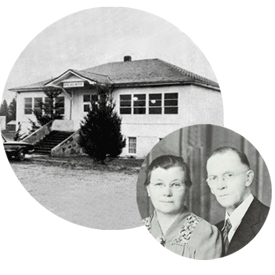Mission Statement
Columbia Bible College seeks to equip people for a life of discipleship, ministry, and leadership in service to the church and community.
Located in Abbotsford, British Columbia, Canada, Columbia Bible College provides faith formation and professional ministry preparation for Christians of all ages as well as supports the churches of the region in the fulfillment of their mission. The College provides both formal and non-formal learning opportunities alongside its role as a resource center for theological information in the region. Theologically, Columbia is evangelical Anabaptist and is operated by two regional Mennonite conferences, British Columbia Conference of Mennonite Brethren Churches and Mennonite Church British Columbia. Columbia is accredited by the international Association for Biblical Higher Education (ABHE), and is designated with the Private Training Institutions Branch of the Advanced Ministry of Education in BC.
Core Values
Following Jesus wholeheartedly
- We worship Jesus Christ as the one true King and seek to model a life that embodies his transforming work in the world.
- Hebrews 12:1-3
Pursuing the truth with humility
- We are curious and courageous, seeking truth, building trust, and bearing witness to what we believe by the power of the Holy Spirit.
- Matthew 7:7-8
Caring for the good and growth of one another
- We believe people matter because they are created in the image of God. We invest in relationships, pursue growth, and seek to cultivate a Christ-centered community.
- 1 Peter 4:8-11
Doing together what needs to be done
-
- We commit to and engage in God’s holistic mission to reconcile all things to himself; together we lean in, and together we serve.
- Colossians 3:23-24
Confession of Faith
Columbia is evangelical Anabaptist and is operated by two regional Mennonite conferences, British Columbia Conference of Mennonite Brethren Churches (BCMB) and Mennonite Church British Columbia (MCBC). The College has adopted both confessions of faith.
Our Story
Two Schools, One Mission
Mennonite Brethren Bible Institute
The Mennonite Brethren school began in the South Abbotsford M.B. Church in 1936 and was called the South Abbotsford Mennonite Brethren Bible School. In 1943, a suitable building was moved to the South Abbotsford church site and the school was renamed Bethel Bible School. Three Mennonite Brethren churches – South Abbotsford, Clearbrook, and Matsqui – joined to support Bethel, which had 34 students that year. The introduction of a high school program led to a temporary relocation of Bethel to a private site in Clearbrook in 1945.
In 1946, the Mennonite Educational Institute moved its high school to the new building in Clearbrook, and Bethel returned to its South Abbotsford campus. Under the leadership of J.F. Redekop, principal from 1944, the school gained the additional support of East Aldergrove, McCallum Road, and Arnold M.B. churches.

Abbotsford MB Bible School 1949-1950

Jacob F. Redekop, MBBI Principal
In 1955, the Bible School Society (consisting of the six supporting churches) purchased land in Clearbrook and erected what is presently the old wing of the classroom building. This became the Mennonite Brethren Bible Institute (M.B.B.I).
In 1960, the B.C. Conference of Mennonite Brethren Churches accepted the responsibility for the operation of M.B.B.I. A record enrollment of 96 was established in 1961-62. The first dormitory was built on the campus in 1962. Increasing enrollments led to two additional dormitories: Redekop Hall in 1966 and Centennial Hall in 1967. A new wing with chapel, classrooms, and music rooms was also added in 1967.
The school year 1970-71 was a memorable one as the Mennonite Brethren Conference of B.C. and the Conference of Mennonites in B.C. entered into a working agreement to operate one Bible school. M.B.B.I. merged with Bethel Bible Institute, which was the Conference of Mennonites’ school, and the new school was renamed Columbia Bible Institute (C.B.I.). To accommodate the 189 students enrolled, a new dining room/student lounge complex was built.
Bethel Bible Institute
The Conference of Mennonites school grew out of the concern to establish Bible school to meet local and provincial church needs. In 1939, Rev. N.W. Bahnman announced the opening of the Bible school in Coghlan (now Aldergrove) on the premises of the Bethel Mennonite Church. Twenty–two people enrolled in the tuition free classes at Bethel, which were taught by three instructors without pay.
A society was formed which operated the school for three years (1941–1944), until the Conference of Mennonites in BC assumed full responsibility for the institute. A four-acre tract of land was purchased in Abbotsford next to West Abbotsford Mennonite Church, and a dormitory for women was built. In 1947, the administration building was erected. In 1951-52, enrollment increased to 61 students and a dormitory for men was built. The women’s dormitory was renovated in 1963. A teacher’s residence was erected in 1964.
When attendance diminished in the sixties and the facilities needed improvement, a special Bethel Bible Institute Study Conference on the future of the school was held in May 1967. After prayerful discernment and much dialogue with the Mennonite Brethren Conference of B.C. in 1968-70, the Conference of Mennonites decided to close Bethel and merge with M.B.B.I. in nearby Clearbrook. Bethel Bible Institute then became Columbia Bible Institute.

Bethel Bible Institute 1963-1964
Meta and Nicoai Behnman, First Principal
A Growing Campus
The decade of the seventies was one of growth and expansion for Columbia Bible Institute. To accommodate a record enrollment of 233 students in 1972-73, four extra housing units (mobiles) were added. In 1975-76, a third year was added to the curriculum and a new record enrollment of 266 was reached.
In 1976, a three-story, apartment –style dormitory was constructed. Two years later, the apartment complex was sold, and five acres of land adjacent to the existing campus were purchased for use as an athletics field and for possible campus development. In 1988, a three-story men’s residence was completed.
Resource Centre
A beautiful office/administration/library complex was constructed in 1992. A covered walkway leads to the Teaching Centre with classrooms, music rooms, and chapel.
Columbia Place
A state of the art Athletics Centre was built in 2001. It is home to the newly named “Bearcats”. It features 2 full size courts and seating for 1000, Fitness Centre, Athletic Therapy Room, Team Room, Classroom and more.
Student Centre
The Student Centre was built in 2004 to serve the students better by featuring a state of the art kitchen and dining room, several student lounges, collegium for commuter students, career and health/wellness center, student life offices, and recreation room.
Redekop Hall
After several years of renting a nearby apartment building, our male residence students returned to campus when Redekop Hall was opened in 2011. The four-story building offers both Junior Housing “pods” with 5 person occupancy as well as Senior Housing suites including full kitchen facilities.
An Historic Covenant
The working agreement between the Mennonite Brethren and the Conference of Mennonites at C.B.I. was studied from time to time with the desire to make it a partnership in equality, not merely a partnership in operation. In 1982, this co-operative effort was expanded into a covenant whereby the Mennonite Brethren invited the Conference of Mennonites to unite in the ownership and development of C.B.I., not merely its operation and governance. At the historic June 11, 1982 joint convention, the Conference of Mennonites responded to the Mennonite Brethren invitation by affirming a continuing covenant of togetherness in working in God’s kingdom. Thus, the first inter-Mennonite Bible Institute in North America was established to actively promote and teach a strong evangelical Anabaptist/Mennonite theology as reflected in the school’s Confession of Faith and confessions of the supporting conferences.
Affiliations
Columbia Bible College represents the cooperative endeavour of the British Columbia Conference of Mennonite Brethren Churches and Mennonite Church British Columbia. The college exists primarily to undergird the ministry of the local church and is dependent upon its support, counsel and prayers. It seeks to understand and incorporate into its program and life the Bible-based Anabaptist heritage of its supporting churches. In this orientation Columbia finds its main challenge and chief distinctive. For more information on either denomination, please use the following links:
Mennonite Brethren Conference Canada

